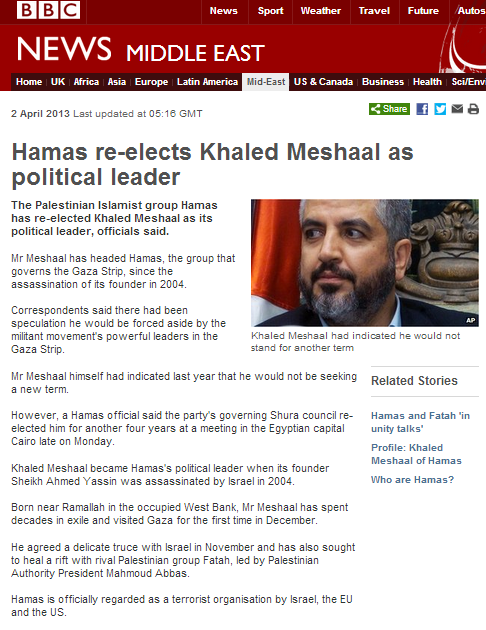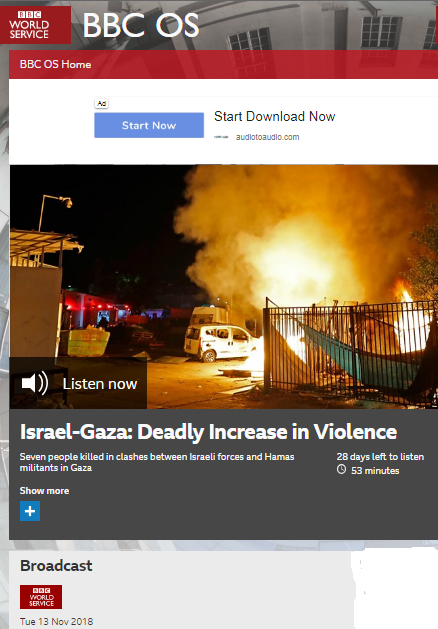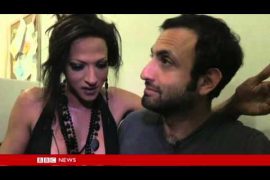A report appearing on the BBC News website’s Middle East page on April 2nd gave a rather terse account of Khaled Masha’al’s recent re-election to a fourth term as head of Hamas.
As may be expected – given the BBC’s policy decision to avoid the use of the word ‘terrorist” – the report employs various euphemisms in order to characterize Hamas: [emphasis added]
“The Palestinian Islamist group Hamas has re-elected Khaled Meshaal as its political leader, officials said.”
“Correspondents said there had been speculation he would be forced aside by the militant movement’s powerful leaders in the Gaza Strip.”
The report also states:
“Mr Meshaal has headed Hamas, the group that governs the Gaza Strip, since the assassination of its founder in 2004.”
And:
“Khaled Meshaal became Hamas’s political leader when its founder Sheikh Ahmed Yassin was assassinated by Israel in 2004.”
In fact, Yassin was succeeded by Abdel-Aziz Rantissi and Masha’al took up the position following Rantissi’s death soon afterwards.
For a more nuanced look at the subject of Masha’al’s re-election, it is worth reading this short article by Jonathan Schanzer.
“In other words, the Hamas leadership selection reflects absolutely no changes in the group’s approach to terrorism or rejectionism. Meshal, during a visit to Gaza in December, vowed that Hamas would continue its strategy of violence against Israel. With a new four-year term, it’s reasonable to expect more of the same.”

One rather curious statement made in the BBC report is this one:
“Born near Ramallah in the occupied West Bank, Mr Meshaal has spent decades in exile and visited Gaza for the first time in December.” [emphasis added]
That theme of ‘exile’ is also promoted in the BBC’s profile of Masha’al.
Whilst the definition of exile includes the possibility of that situation being self-imposed, most readers of that sentence would be likely to understand it in accordance with its more prevalent use:
“the state of being barred from one’s native country, typically for political or punitive reasons”
Of course Masha’al does not fit into that category, as an interview he gave in 2008 indicates.
“I was born in Silwad, near Ramallah, in 1956. I lived there until 1967, when I was 11 years old, having completed the fifth grade in Silwad Elementary School.” […]
“My father had been in Kuwait since 1957, where he worked both in agriculture (he was, of course, a fallah) and as an imam in a mosque, based on his religious background and culture and memorization of a very large part of the Quran. My father, by the way, had participated in the 1936 Rebellion with ‘Abd al-Qadir al-Husayni and that generation. So because my father was in Kuwait, our family followed. We went to Jordan immediately after the war, and after a month or two, during the summer of 1967, we continued on to Kuwait.”
So in fact, the head of the Masha’al family had moved to Kuwait a decade before the Six Day War – whilst Masha’al’s native village was under Jordanian rule – and the rest of the family joined the father in 1967 of its own free will.
Later on in the interview we learn that Masha’al was apparently not “barred” from visiting his native village – or indeed anywhere in Israel – eight years later:
“Because we were among the tens if not hundreds of thousands of Palestinians who migrated from Palestine immediately after the 1967 war and were therefore not included in the census conducted by the Israelis in September 1967, we were not issued identity cards. We therefore did not have the right to visit our country on the basis of citizenship or residency, but only on the basis of a visitor’s permit that could be obtained for us by relatives still there. I was keen to visit, and in 1975, while a university student, I visited Silwad with my family for two months. This was my first and unfortunately only visit after 1967. Since then, my personal circumstances have prevented another such visit on account of my involvement in politics and the national struggle.
During that trip in 1975 I was able to travel extensively in Palestine, touring the country and visiting the cities of the West Bank and the Palestine lost in 1948. I was supposed to go to the Gaza Strip as well, but unfortunately those who were responsible for arranging this part of my journey were unable to do so. We went to Jerusalem and al-Aqsa Mosque, to Nablus, Jenin, and so on, to Nazareth, Haifa, Jaffa, and the Palestinian coast, but after the Gaza part of the journey did not materialize we returned to the West Bank.”
Despite the Israeli withdrawal from the Gaza Strip in 2005 and the violent 2007 coup which led to Hamas gaining control of the territory, Masha’al – like the rest of his ‘exiled’ comrades in the Hamas politbureau – chose to remain elsewhere. For the sake of accuracy and clarity of audience understanding, the BBC should therefore amend that sentence to read:
“Mr Meshaal has spent decades in self-imposed exile and visited Gaza for the first time in December.”





